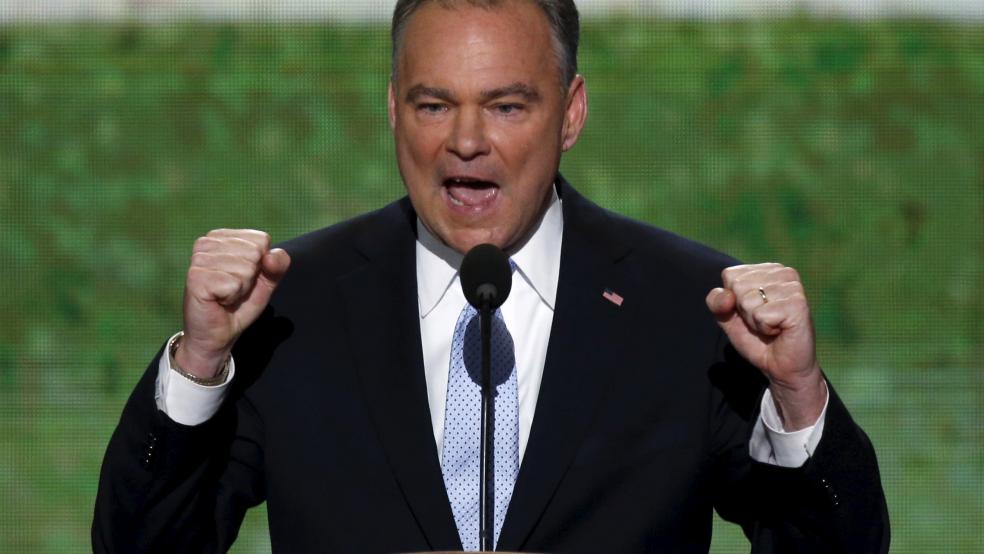Sen. Tim Kaine of Virginia is Hillary Clinton’s choice as vice president. The presumptive Democratic presidential nominee announced her choice of running mate on Friday, opting for a highly regarded politician with plenty of experience but little panache.
Clinton texted her decision to supporters late Friday and is expected to make a joint appearance with Kaine in Miami today before they head for the Democratic National Convention. "I’m thrilled to tell you this first,” the text read. “I’ve chosen Sen. Tim Kaine as my running mate. Welcome him to my team.”
Clinton’s VP List May Have Just Gotten a Little Shorter
Kaine, 58, a centrist Democrat with an impressive resume from a key battleground state, is a popular choice among many of the convention delegates, although more liberal Democrats are concerned about some of his views on trade and banking industry regulation.
The former Richmond mayor, Virginia governor and Democratic National Committee chair, is viewed by many as Clinton’s safest choice because of his breadth of experience in foreign policy and domestic issues. His even-tempered demeanor could help Clinton defeat Republican nominee Donald Trump in Virginia -- one of a handful of battleground states that will determine the election.
While he lacks the political glitter of some of the other Democrats Clinton vetted for the job, including Sens. Elizabeth Warren (D-MA) and Cory Booker (D-NJ), Kaine has the advantage of being a close and trusted friend of Clinton’s.
As a member of the Foreign Relations and Armed Services Committees, Kaine is also well-versed in foreign policy and defense, and will be able to hold his own in any debates this fall with Indiana Gov. Mike Pence, Trump’s vice presidential running mate.
Related: Top Picks for Hillary Clinton's Vice President
While Clinton considered an array of other candidates, including Agriculture Secretary Tom Vilsack, she settled on her long-time friend Kaine who she viewed as a strong partner who would watch her back during the campaign and then could work well with him if they make it to the White House.
While an affable and low-key politician who recently described himself as "boring," Kaine is also a tough negotiator and debater, and will be highly useful in fending off Republican attacks on Clinton regarding her email controversy and her record on foreign policy during her four years as President Obama's secretary of state.
Clinton has often said that her top criteria for a vice president is finding someone who is prepared to become commander in chief, and Kaine comes closest to filling that bill.
However, Kaine is not universally popular in his party. Sen. Bernie Sanders of Vermont, Clinton’s chief rival during the Democratic primaries, and other party liberals had hoped for a more progressive choice for vice president—someone like Warren or Sen. Sherrod Brown (D-OH). Some liberals are also concerned about Kaine’s position in support of global trade deals and his views on Wall Street regulations.
For instance, he has been a strong supporter of the North American Free Trade Agreement (NAFTA) and the pending Trans-Pacific Partnership agreement (TPP), which Sanders and many other liberals blame for the loss of manufacturing jobs in Rust Belt states.
Related: Are Clinton and Trump Really in a Dead Heat?
Late this week, liberal activists who backed Sanders for the presidential nomination complained that Kaine signed a bipartisan letter urging the Consumer Financial Protection Bureau to “carefully tailor” its rulemaking with regards to community banks and credit unions to avoid unduly burdening them with government red tape. Kaine and others signed the letter because many small community banks cannot afford the legion of compliance officers that big banks have hired to meet the demands of the new regulations. As a result, many community banks have closed their doors permanently.
Charles Chamberlain, the executive director of Democracy for America, told The Washington Post that signing that letter should automatically disqualify Kaine from being picked as Clinton’s running mate because he was helping banks to “dodge consumer standards.”
Kaine, a Harvard Law School graduate, grew up in an Irish Catholic family in a suburb of Kansas City, Kansas. At one point, he did Jesuit missionary work in Honduras and is fluent in Spanish. After marrying, he and his wife settled in Richmond, where he set up a law practice and launched his political career.
After a stint as Richmond mayor, Kaine was elected lieutenant governor in 2001 and then was elected governor in 2005. Kaine was an early supporter of Barack Obama’s 2008 presidential campaign and was a finalist to become Obama’s running mate – but he lost out in the end to Joe Biden. After the election, he was rewarded with an appointment as chair of the Democratic National Committee while still serving as governor.
Kaine then went on to defeat former Republican governor George Allen in the 2012 election for Senate. As a freshman member of the Senate, Kaine received choice committee assignments and became an expert on the Middle East and other global hot spots.





